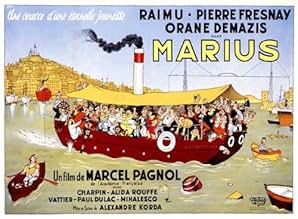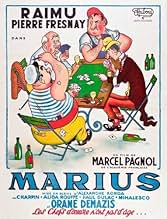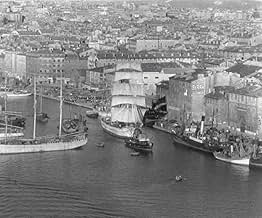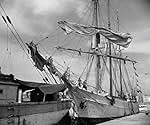Marius
- 1931
- Tous publics
- 2h 10m
IMDb RATING
7.8/10
2.7K
YOUR RATING
Marius is faced with a choice whether to fulfill his passion by sailing the seas or stay and marry the woman he loves.Marius is faced with a choice whether to fulfill his passion by sailing the seas or stay and marry the woman he loves.Marius is faced with a choice whether to fulfill his passion by sailing the seas or stay and marry the woman he loves.
Fernand Charpin
- Honoré Panisse
- (as Charpin)
Alexandre Mihalesco
- Piquoiseau
- (as Mihalesco)
Lucien Callamand
- Le quartier-maître du ferry-boat
- (uncredited)
Zé Digiovanni
- Innocent Mangiapan
- (uncredited)
Milly Mathis
- Tante Claudine Foulon
- (uncredited)
Valentine Ribe
- Un client
- (uncredited)
- …
Featured reviews
1931 was quite a year for movies, while the talkies started in the late 20's with "The Jazz Singer", it's only in 1931 that directors found better than fluffy Broadway comedies to reach the audiences and made the first classic talking pictures, from seminal gangster movies "Little Caesar" and "The Public Enemy" to horror landmarks "Dracula" and "Frankenstein", each films providing iconic moments and, for the first time, immortal quotes establishing in the most complete way the different aspects of cinema's appeal: characters, visuals, special effects but also an art-form of the verb. Edward G. Robinson would be one of the first voices with a specific intonation and accent and inevitably, the first to ever be parodied and remembered, see?
And in France, it's only fair that one of the first voices to ever "grace" the screen (so to speak) and to also be imitated would have the singing intonation of that French Provence accent, the Mediterranean South with that "Little Italy" touch, where people display a temperament of histrionic bad faith but ultimately pride and a heart, as big as forty 'Cannebières' all contained in the magnificent baritone voice of Jules Muraire aka Raimu aka César, the bartender of Marseilles. It is very interesting that the film is most remembered for the scene where he plays a French version of pinochle with his friends and to lure his teammate Captain Felix Escaterfigue (Paul Dullac) to play the "heart", he keeps repeating "you break my heart" and it only gets hilarious because Felix can't figure what he means until it becomes apparent for everyone but him. And in the most childish way, César acts offended when he's finally accused by Panisse (Honoré Chapin) who wasn't the brightest bulb either.
That's what Alexandre Korda's "Marius" is about actually: heart and playing, or cheating, French viewers remember "You're breaking my heart" and repeat it with the same accent as one would quote Arnie with Austrian robotic tone, but it takes the viewing of "Marius" to see how emblematic to the story this scene is: the film is about people in love, it's a romance, a love triangle between three characters who know as much about love as they know about themselves, and that's exactly what either drives or undermines their momentum. Young César's son Marius (Pierre Fresnay) is in love with little seashell merchant Fanny (Orane Demazis) and daughter of fish store owner Honorine (Alida Rouffe) but after years of wandering in Marseilles' streets and watching ships sailing to the seven seas, the call of the sea got louder and louder.
And there's Panisse who's a widower in his fifties and can only offer his money, he's respectful enough to Fanny that he takes his time to court her, makes no lies about his intention and even approaches her mother Honorine; in the process, he also makes a rival out of young impetuous Marius. Fanny is torn between a young man she loves but conveniently never admitted her love and one proposing a marriage of convenience. And in the middle of this conflict, César is the (not so) passive observer, acting more like a Greek chorus to a tragicomedy full of such larger-than-life characters that even this two-hour movie couldn't sustain it. That's the power of Pagnol's characters, they didn't wait for the film to be fully developed, the film didn't need any exposition, the characters are here, and when the movie ends, we're looking forward to the sequel "Fanny".
A few people can create a world that feels realer than the real world, and with a slice of Provence's life, Pagnol made a real "Human Comedy" à la Balzac that would forever enchant French culture and lead to the two-parters "Jean de Florette / Manon of the Spring" and "My Father's Glory / My Mother's Castle". But let's get back to the one that started them all: there's a lot to say about "Marius", it provides the first sound to ever reach the hearts and screens of people, the visual quality gets blurry at time, but this is a movie as complete and professional as any creation and with a little screeching sound that almost resonates like the grasshoppers of the countryside. "Marius" carried the word 'iconic' because of the accent, the landscape but more than anything, the performance of Raimu whom Orson Welles called the "greatest actor alive", and seriously, I've rarely seen such natural and modern performances in an "old" movie.
It takes you to know French or have subtitles to appreciate the film but even without understanding a word, you can see how authentic everything is. The film is adapted from a successful play, but it doesn't feel theatrical at all unless you consider theatrical the tantrums of these Mediterranean fellows. Indeed, it brings France to the talkies' era without needing a genre: no horror, no gangster, just a simple but high drama about life and decisions to take. The climax is the culmination of such torments. We are used to see people who must make a choice between heart and reason, but for the first time, we also have the choice of instinct, and the center of the choice is "Marius" who must think of his love for Fanny, her reputation and his all-time dreams. The conflict is so tense that we can even feel the smell of the sea.
Right again, a very specific story with very specific characters but one of universal implications like Marcel Pagnol knows how to craft, and how fitting that the man born the same year than Cinema would contribute to the film that marked the birth of French Cinema. Of course, I mean modern cinema because Cinema was born French already and the first film was the famous train arriving at La Ciotat not far from Pagnol's hometown Aubagne or from Marseilles, the setting (and heart) of the Provence trilogy.
And in France, it's only fair that one of the first voices to ever "grace" the screen (so to speak) and to also be imitated would have the singing intonation of that French Provence accent, the Mediterranean South with that "Little Italy" touch, where people display a temperament of histrionic bad faith but ultimately pride and a heart, as big as forty 'Cannebières' all contained in the magnificent baritone voice of Jules Muraire aka Raimu aka César, the bartender of Marseilles. It is very interesting that the film is most remembered for the scene where he plays a French version of pinochle with his friends and to lure his teammate Captain Felix Escaterfigue (Paul Dullac) to play the "heart", he keeps repeating "you break my heart" and it only gets hilarious because Felix can't figure what he means until it becomes apparent for everyone but him. And in the most childish way, César acts offended when he's finally accused by Panisse (Honoré Chapin) who wasn't the brightest bulb either.
That's what Alexandre Korda's "Marius" is about actually: heart and playing, or cheating, French viewers remember "You're breaking my heart" and repeat it with the same accent as one would quote Arnie with Austrian robotic tone, but it takes the viewing of "Marius" to see how emblematic to the story this scene is: the film is about people in love, it's a romance, a love triangle between three characters who know as much about love as they know about themselves, and that's exactly what either drives or undermines their momentum. Young César's son Marius (Pierre Fresnay) is in love with little seashell merchant Fanny (Orane Demazis) and daughter of fish store owner Honorine (Alida Rouffe) but after years of wandering in Marseilles' streets and watching ships sailing to the seven seas, the call of the sea got louder and louder.
And there's Panisse who's a widower in his fifties and can only offer his money, he's respectful enough to Fanny that he takes his time to court her, makes no lies about his intention and even approaches her mother Honorine; in the process, he also makes a rival out of young impetuous Marius. Fanny is torn between a young man she loves but conveniently never admitted her love and one proposing a marriage of convenience. And in the middle of this conflict, César is the (not so) passive observer, acting more like a Greek chorus to a tragicomedy full of such larger-than-life characters that even this two-hour movie couldn't sustain it. That's the power of Pagnol's characters, they didn't wait for the film to be fully developed, the film didn't need any exposition, the characters are here, and when the movie ends, we're looking forward to the sequel "Fanny".
A few people can create a world that feels realer than the real world, and with a slice of Provence's life, Pagnol made a real "Human Comedy" à la Balzac that would forever enchant French culture and lead to the two-parters "Jean de Florette / Manon of the Spring" and "My Father's Glory / My Mother's Castle". But let's get back to the one that started them all: there's a lot to say about "Marius", it provides the first sound to ever reach the hearts and screens of people, the visual quality gets blurry at time, but this is a movie as complete and professional as any creation and with a little screeching sound that almost resonates like the grasshoppers of the countryside. "Marius" carried the word 'iconic' because of the accent, the landscape but more than anything, the performance of Raimu whom Orson Welles called the "greatest actor alive", and seriously, I've rarely seen such natural and modern performances in an "old" movie.
It takes you to know French or have subtitles to appreciate the film but even without understanding a word, you can see how authentic everything is. The film is adapted from a successful play, but it doesn't feel theatrical at all unless you consider theatrical the tantrums of these Mediterranean fellows. Indeed, it brings France to the talkies' era without needing a genre: no horror, no gangster, just a simple but high drama about life and decisions to take. The climax is the culmination of such torments. We are used to see people who must make a choice between heart and reason, but for the first time, we also have the choice of instinct, and the center of the choice is "Marius" who must think of his love for Fanny, her reputation and his all-time dreams. The conflict is so tense that we can even feel the smell of the sea.
Right again, a very specific story with very specific characters but one of universal implications like Marcel Pagnol knows how to craft, and how fitting that the man born the same year than Cinema would contribute to the film that marked the birth of French Cinema. Of course, I mean modern cinema because Cinema was born French already and the first film was the famous train arriving at La Ciotat not far from Pagnol's hometown Aubagne or from Marseilles, the setting (and heart) of the Provence trilogy.
Marius (1931) :
Brief Review -
A Cult Classic. Just WOW. French Cinema shows why Men can never understand selfless Women and believe me every man gonna drop tears. I love those rare moments when I write review with tears in my eyes and i am very grateful to Alexander Korda for this Classic Tear-jerker because it worth every single drop of my tears. So Marius is not in IMDb Top Rated, not in any popular films list then just burn those lists, I don't give a damn to such low standard list. You know, i have a special place in my heart for some films where I get to see rich content driving to selfless sacrifice, just for the reference I would mention 'Casablanca' (1942) here, and Marius is closest or leveled to that Masterpiece. Not to forget that Marius came 11 years before Casablanca so obviously it deserves more credit. There have been films where we saw Women sacrificing so much for the Men they love but i don't think any movie will come close to Marius as far as the quality and emotions of storyline are concerned. The film about Marius who is faced with a choice whether to fulfill his passion by sailing the seas or stay and marry the woman he loves. One thing is certainly wrong with the film that it is not flawless in the first half. It is more like a comedy in the first half but then it gets to the main point in the second half and leaves you Speechless. I might be running short of words to explain how gorgeously and smoothly this films shows Woman's sacrifice and how painful it was to see the climax. There are so many heart-touching scenes in the last one hour which teach you a lot about Women's selfless love and Father and Son's Relationship. This film is named after a Man but glorifies the Woman and i bet every Man who sees this film is going to feel it for her, roll down tears for her. I don't want to say anything more than it's a MUST WATCH and i am feeling blessed to have this Cult French Drama.
RATING - 8.5/10*
By - #samthebestest
A Cult Classic. Just WOW. French Cinema shows why Men can never understand selfless Women and believe me every man gonna drop tears. I love those rare moments when I write review with tears in my eyes and i am very grateful to Alexander Korda for this Classic Tear-jerker because it worth every single drop of my tears. So Marius is not in IMDb Top Rated, not in any popular films list then just burn those lists, I don't give a damn to such low standard list. You know, i have a special place in my heart for some films where I get to see rich content driving to selfless sacrifice, just for the reference I would mention 'Casablanca' (1942) here, and Marius is closest or leveled to that Masterpiece. Not to forget that Marius came 11 years before Casablanca so obviously it deserves more credit. There have been films where we saw Women sacrificing so much for the Men they love but i don't think any movie will come close to Marius as far as the quality and emotions of storyline are concerned. The film about Marius who is faced with a choice whether to fulfill his passion by sailing the seas or stay and marry the woman he loves. One thing is certainly wrong with the film that it is not flawless in the first half. It is more like a comedy in the first half but then it gets to the main point in the second half and leaves you Speechless. I might be running short of words to explain how gorgeously and smoothly this films shows Woman's sacrifice and how painful it was to see the climax. There are so many heart-touching scenes in the last one hour which teach you a lot about Women's selfless love and Father and Son's Relationship. This film is named after a Man but glorifies the Woman and i bet every Man who sees this film is going to feel it for her, roll down tears for her. I don't want to say anything more than it's a MUST WATCH and i am feeling blessed to have this Cult French Drama.
RATING - 8.5/10*
By - #samthebestest
With its stagy direction, its straightforward storyline and its lovable character depictions this first part of Marcel Pagnol's Marseilles trilogy offers a welcome relief from today's often all too florid movies.
Of course, it all seems quite broad, static and dated at first, but if you look behind the theatrics, the powerful sincerity and humanity of Pagnol's vision - coupled with some wonderful performances and the writing's flawless mélange of bitterness and sweetness, of jocular humour and heartwarming sentiment, of life's average highs and lows - more than make up for it.
8 out of 10 cuckolded sailors
Of course, it all seems quite broad, static and dated at first, but if you look behind the theatrics, the powerful sincerity and humanity of Pagnol's vision - coupled with some wonderful performances and the writing's flawless mélange of bitterness and sweetness, of jocular humour and heartwarming sentiment, of life's average highs and lows - more than make up for it.
8 out of 10 cuckolded sailors
This is, of course, the first leg of one of the all-time great trilogies and Londoners were able to see all three - weighing in at a little over six hours - in one day recently. When you know that a given title was made at the dawn of the talkies - in this case 1931 - you go prepared to make allowances if only subconsciously but such is the artistry on display here you soon forget even that and just bask in superb ensemble playing led by the irreplacable Raimu. An Academic writing about 'French' film recently dismissed Pagnol as a 'minor' writer. Yeah, you didn't misread. These are the guys entrusted with the further education of a whole generation. Personally I don't know how many 'minor' writers are invited by the Academie Francaise to join its ranks but Pagnol (who at the time the trilogy was made was the youngest writer to be admitted to this august body) isn't one of them. I shouldn't really write the words Academic and Pagnol in the same sentence because Pagnol is a dirty word in Academe. The reason? He's POPULAR and, by definition, 'accessible' which means that the average Joe can UNDERSTAND what he's saying and where he's coming from thus leaving nothing for the Academics to 'interpret'. Write a book that three people buy and one of them understands about 40 per cent of and you've got it made academic-wise. You'll be 'taught' for years and academics will write books ABOUT your book in inpenetrable jargon that only OTHER academics can understand - it's the written equivalent of a Masonic handshake. So no laurels for Pagnol. So what. This first episode - and each of the three stories is self-contained despite featuring the same locale and characters; Alan Ayckbourn did much the same thing 50 years later with 'The Norman Conquests' - spreads the tablecloth and sets out the banquet; locale: the waterfront, Marseilles; principals; Cesar, the bar owner, Marius, his son, Fanny, the ingenue, in love with Marius, Panisse, the sail-maker also in love with Fanny though 30 years older; supporting characters; Honorine, mother to Fanny, and Claudine, sister to Honorine, Piquoiseau, Escartifigue, Monsieur Brun, light relief. These are the basic threads which Pagnol weaves into a tapestry to rival that of Bayeux. Having set the scene masterfully and introduced us to the characters we get the conflict: Fanny loves Marius, Marius loves Fanny but he also loves the sea and waiting in the wings is Panisse in case the lure of what Gene O'Neill describes as 'dat ol' debbil sea' proves too much. Incredibly the citizens of Southern France, Toulouse, Avignon, etc, though highly intelligent and sensitive still feel bitter and resentful and unforgiving of Pagnol whom they see as someone who portrayed them as little more than buffoons. This first part gives the lie to that accusation. 9/10
I don't know how much new I have to say about this movie that others have not said already. I have watched this movie over and over, I have had the pleasure of teaching it in a French literature and culture course. Every time I watch it I marvel at how well it is done. The acting is uniformly excellent - but then, these actors had performed the play from which this movie was drawn hundreds of times and had been hand-picked by Pagnol. They will definitely strike modern audiences as theatrical, but that is one of the points Pagnol was making about the people of Marseille: they were fond of drama and "performed" in life. The script is clever, and sometimes hilarious. Scenes like 1) César teaching Marius how to make a mandarin-citron (a drink); 2) César, Panisse, Escartefigue, and M Brun playing a round of cards with César cheating; 3) Marius fuming when Panisse makes passes at Fanny in the bar; and many others are even funnier the 10th time than the first. The music is wonderful. In short, this movie is a marvel, full of acting gems. See it!
Did you know
- Trivia"Asterix and the Banquet", the fifth volume in the popular French "Asterix" comic book series, visually references the film by having a tavern resemble the one in the film and populating it with characters based on those played by Raimu, Fernand Charpin, Paul Dullac, and Robert Vattier.
- Goofs(at around 11 mins) Honorine (Alida Rouffe) is talking with César. She puts her glass on the table, but after a cut, she puts the same glass again on the table.
- Quotes
César Olivier: I was 32 when my rump felt my father's boot for the last time. We knew what love and respect were in those days.
Marius: With a boot up your rear.
César Olivier: And we didn't answer back.
- ConnectionsAlternate-language version of Längtan till havet (1931)
- How long is Marius?Powered by Alexa
Details
Box office
- Gross US & Canada
- $8,262
- Opening weekend US & Canada
- $7,720
- Jan 8, 2017
- Gross worldwide
- $8,262
- Runtime2 hours 10 minutes
- Color
- Aspect ratio
- 1.20 : 1
Contribute to this page
Suggest an edit or add missing content
































